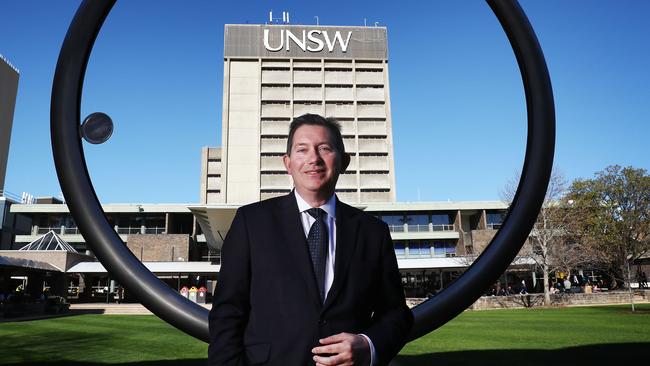Coronavirus: Job fears as universities reject pay cuts
Fears are growing of huge job losses in the university sector after two more rejected a union-backed deal to increase job protection.

Fears are growing of huge job losses in the university sector after two more universities rejected a union-backed deal to increase job protection for university staff in exchange for pay cuts.
UNSW and CQUniversity, joined at least eight other universities in declining to join the deal, called the jobs protection framework, which was negotiated between the universities’ own employer group, the Australian Higher Education Industrial Association, and the National Tertiary Education Union.
UNSW faces a revenue hit of up to $600 million from international students losses following the COVID-19 travel ban — worse than any other Australian university — and its rejection of the pay cut deal signals that major job cuts are likely to follow.
A joint message to UNSW staff from vice-chancellor Ian Jacobs and provost Anne Simmons said: “Given the scale of the financial pressures we are facing, we cannot pursue the NTEU-AHEIA proposal.”
They said they were concerned that adopting the pay cut deal would constrain the university “in making important decisions about managing the implications of COVID-19 over the next year”.
CQUniversity vice-chancellor Nick Klomp said that his university executive had decided against adopting the jobs protection deal because it would only give the university temporary financial relief while reducing conditions for all staff.
“CQUniversity Executive does not support enforced pay cuts and reduced working hours, which would be by far the biggest contributors to any temporary cost savings,” Professor Klomp said.
“CQUniversity must be focused on long-term success and sustainability rather than temporary cost reduction measures.”
The jobs protection framework would have reduced the pay of staff (excepting casual employees) at a participating universities by up to 15 per cent for one year. In return. universities would not involuntarily stand down staff without pay and would undertake to exhaust all options before making staff redundant.
Universities would also be required to open their books to a national panel, made up of three university nominees, three union nominees and an independent chair, which would judge how severe a university’s financial situation was and whether staff would be required to take a pay cut of 5 per cent or 15 per cent.
In order for a university to participate in the job protection framework, a majority of its staff would have to support a temporary, 12-month change to their enterprise bargaining agreement.
Eight other universities have already rejected the framework, or indicated they are very unlikely to take part. However the NTEU national council approved the job protection framework on Wednesday, which cleared the last obstacle on the union side to it going ahead.
The NTEU estimates that adopting the framework nationally would save about 12,000 jobs in universities, against the 21,000 which Universities Australia expects are likely to be lost this year due to COVID-19 if no action is taken.
The union’s national president Alison Barnes said the UNSW email to staff was “callous and self-defeating”.
“It is mind-blowingly irresponsible, especially when a framework has been built which will allow them to treat staff with fairness and preserve and retain their greatest assets — their people,” she said.
NTEU Queensland secretary Michael McNally said that CQUniversity had “opted for job cuts over job security”.
“It’s a slap in the face for university staff who offered to take leave, forego pay rises, take part-time appointments and even take a temporary pay cut to save their colleagues’ jobs,” he said.




To join the conversation, please log in. Don't have an account? Register
Join the conversation, you are commenting as Logout